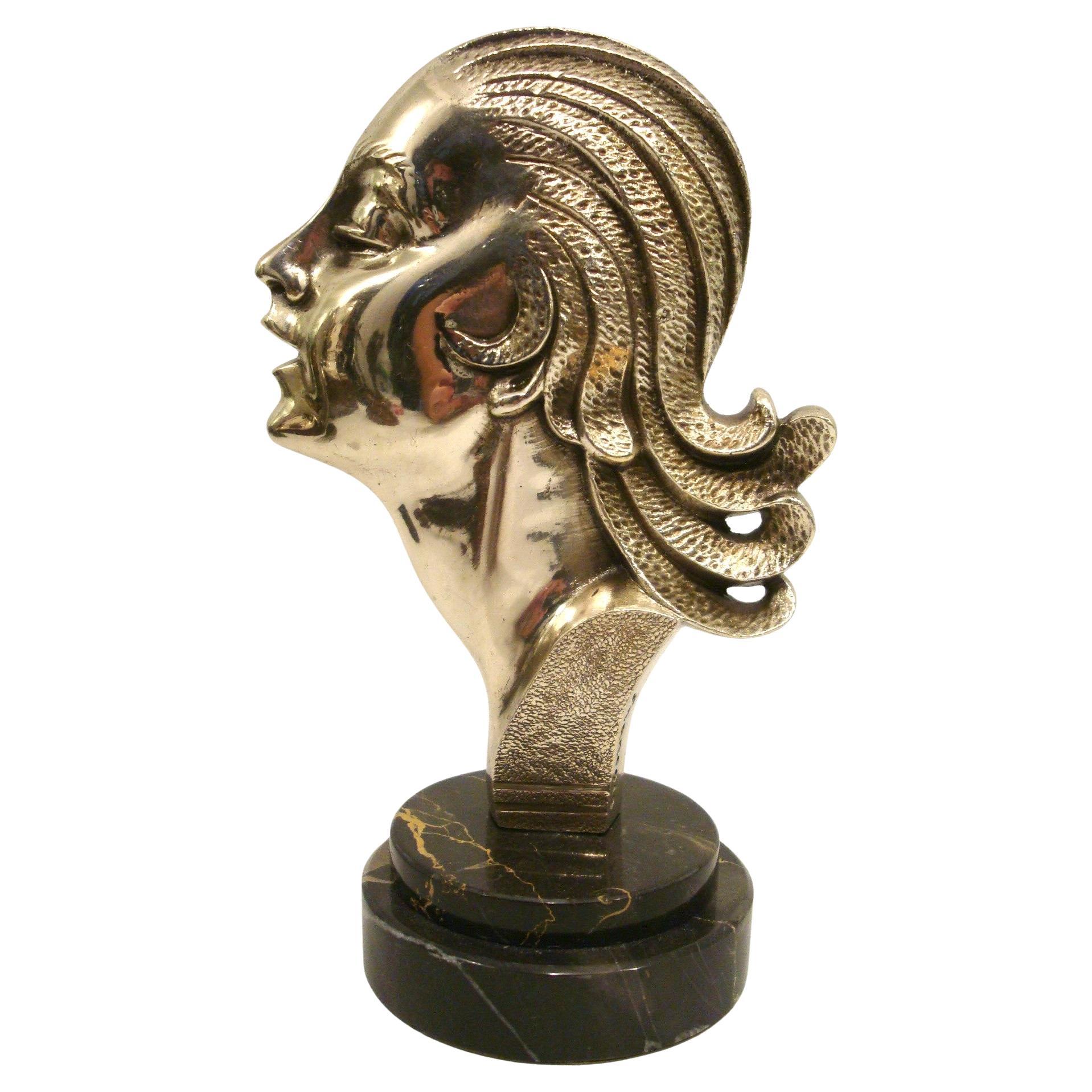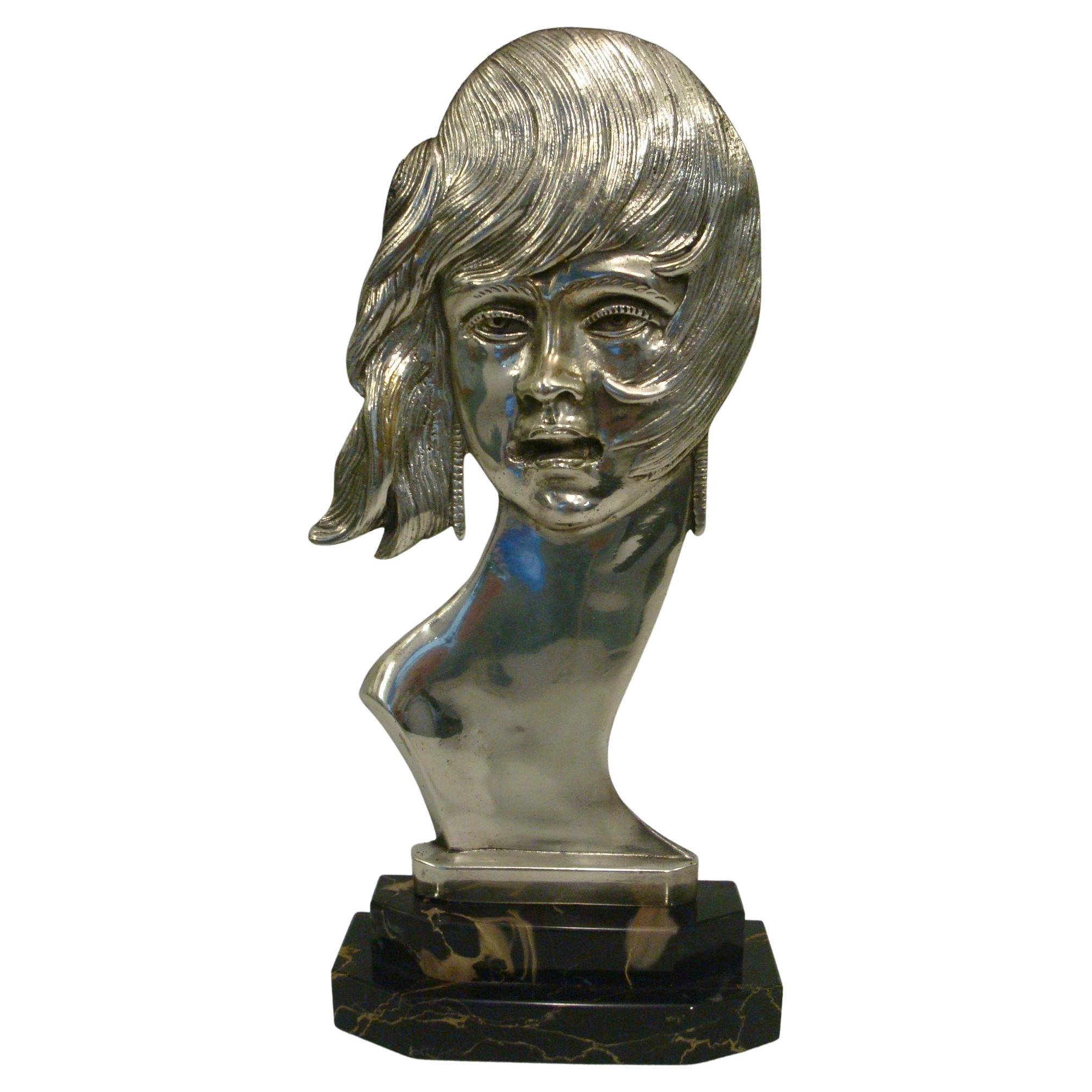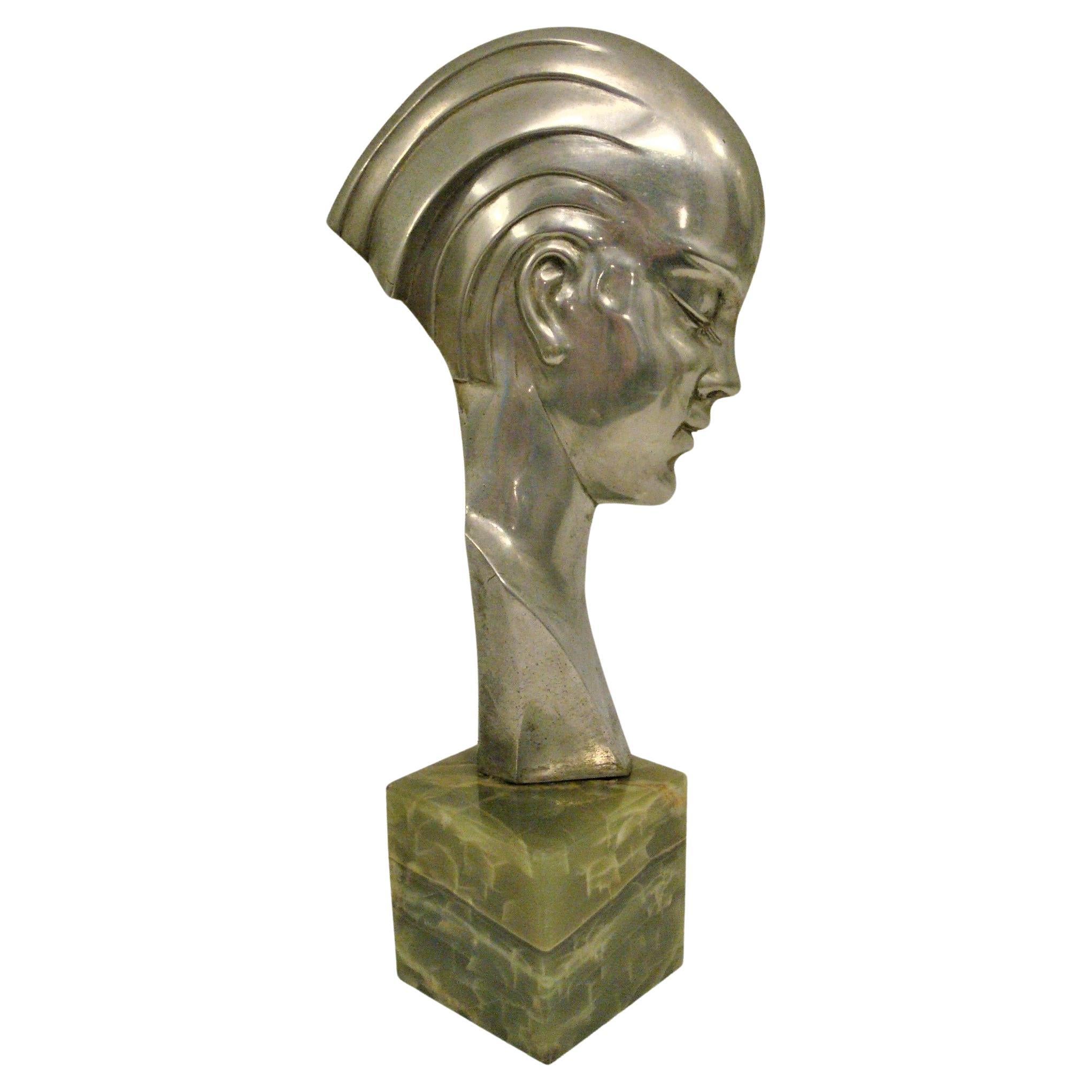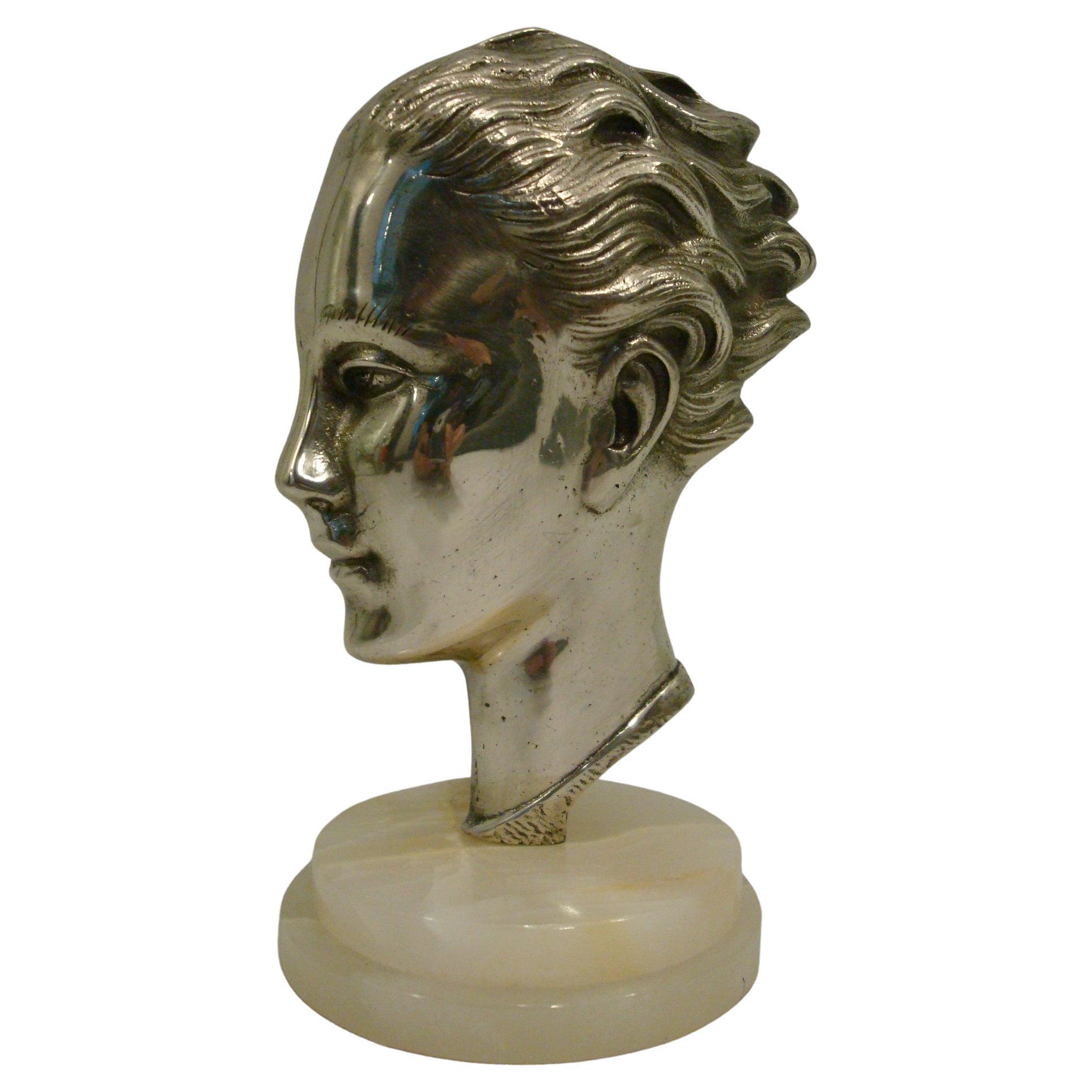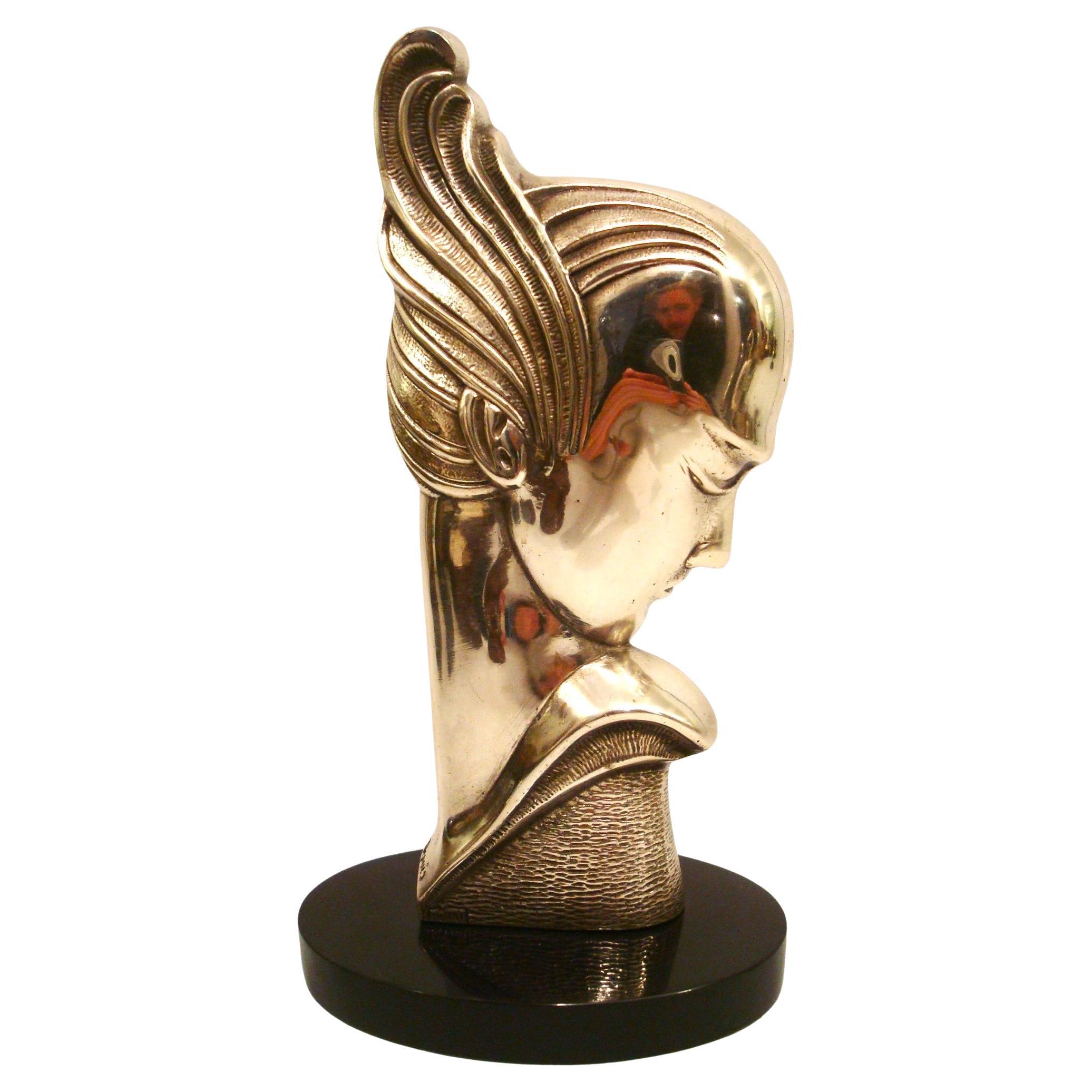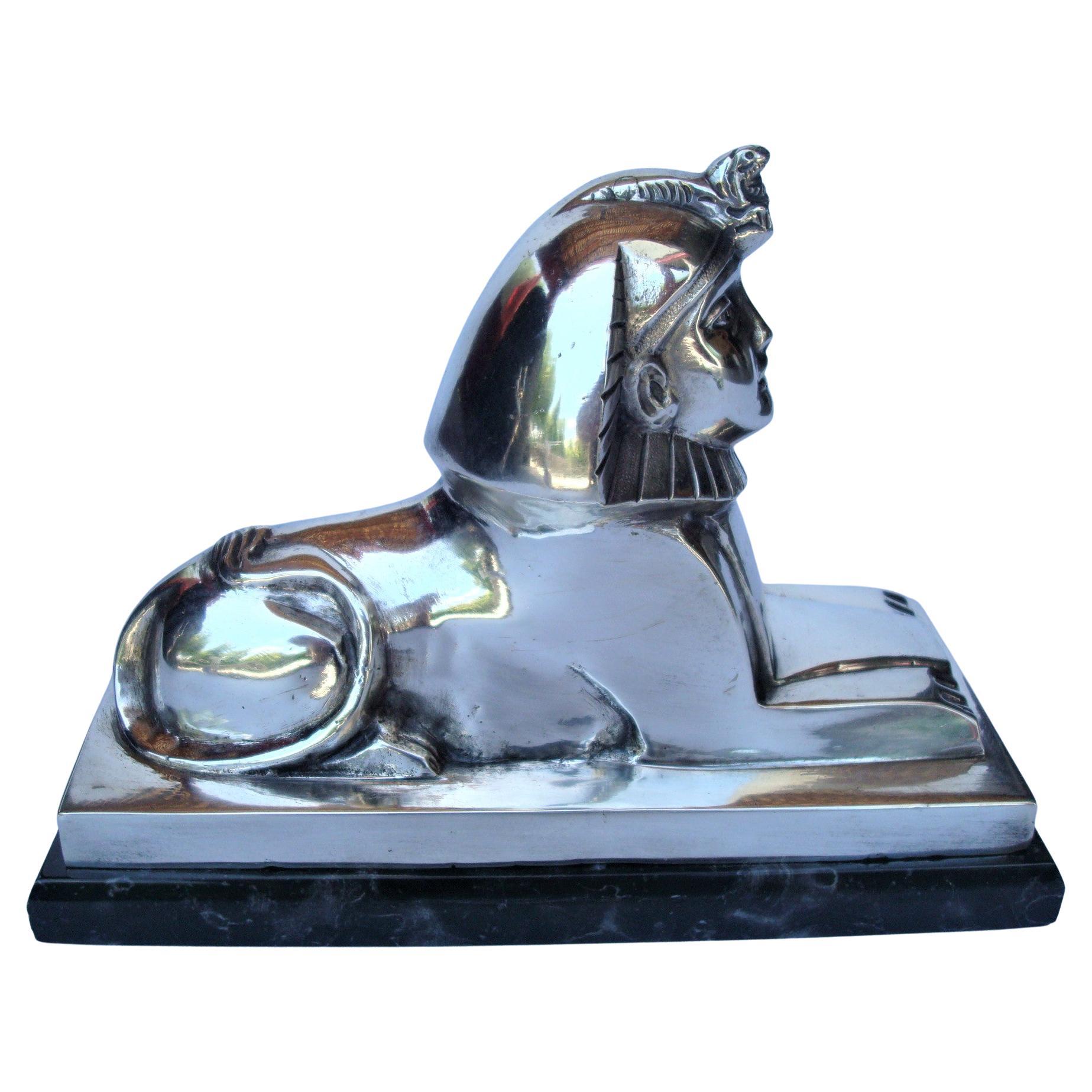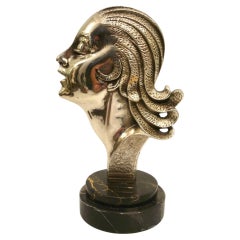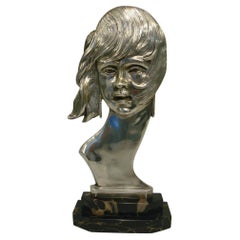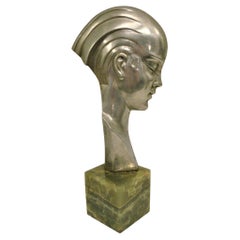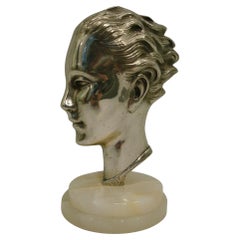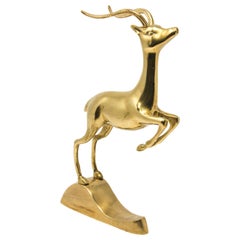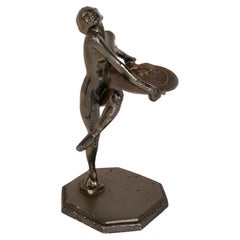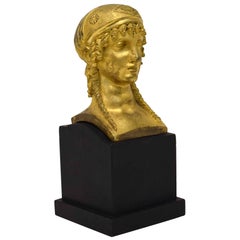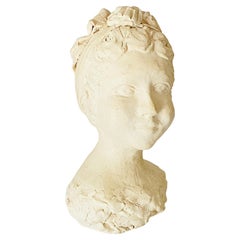Artículos similares a Art Deco Bronze Bust Sculpture of a Woman / France, 1930
¿Quieres más imágenes o vídeos?
Solicita imágenes o vídeos adicionales al vendedor
1 de 10
Art Deco Bronze Bust Sculpture of a Woman / France, 1930
Acerca del artículo
Art Deco bust of a woman. Silvered bronze sculpture of a moderniste lady.
Mounted over a Italian marble base. Signed on the base Auscher. France 1930
Perfect desk piece or paperweight.
We have specialized in the sale of Art Deco and Art Nouveau and Vintage styles since 1995. If you have any questions we are at your disposal. Pushing the button that reads 'View All From Seller'. And you can see more objects to the style for sale. Why are there so many antiques in Argentina?
In the 1880 – 1940 there was a grate wave of immigration encouraged by the periods of war that were taking place. 1st World War took place between 1914 and 1918 2nd World War took place between 1939 and 1945 The immigrants options were New York or Buenos Aires. Tickets were cheap and in Buenos Aires they were welcomed with open arms, as it was a country where everything was still to be done. Argentina was the country of new opportunities, labour was needed and religious freedom was assured, in many cases the of the family travel first until they were settled and then the rest of the family members join them. In the immigrant museum “Ellis Island Immigrant Building” in New York you can se the promotional posters of the boats that would take them to a new life. Between the years 1895 and 1896, Argentina had the highest DGP (gross domestic product) per capita in the world according to the Maddison Historical Statistics index, this situation arose due to the large amount of food being exported to European countries, which were at war. The Argentinean ships left the port of Buenos Aires with food, but they returned with furniture, clothes and construction elements, (it´s common to see this the old buildings of the historic neighbourhood of San Telmo, the beams with the inscription “Made in England)”, as well as many markets that were built in Buenos Aires, such us the San Telmo Market, whose structure was brought by ship and afterwards assembled in 900 Defensa Street. With the great influence of European immigrants living in the country, the children of the upper classes travelled to study in France, resulting in the inauguration of “La Maison Argentinienne”, on 27th of June 1928, in the international city of Paris, which hosted many Argentinians that were studying in Frace. It´s the fourth house to be built after France, Canada and Belgium, being the first Spanish-speaking one. Still in place today (17 Bd Jourdan, 75014, Paris, France). Many of the children of these wealthy families who attended international art exhibitions, museums and art courses abroad, took a keen interest in the European style. This is why Buenos Aires was at the time referred as “The Paris of South America”. Between the years 1890 and 1920 more than a hundred Palaces were built on Alvear Avenue the most exclusive avenue in Buenos Aires. Today some of these palaces have been transformed into museums, hotels and embassies. In the year 1936, the Kavanagh building was inaugurated, it was the tallest reinforced concrete building in South America. During 1994 the American Society of Civil Engineers distinguished it as an “international engineering milestone”, and it´s now considered a World Heritage of Modern Architecture. At the time was common to hire foreign architects such as Le Corbusier, who visited Buenos Aires/Argentina in 1929 and in 1948 he drew up the blueprints for a house built in La Plata City (which was declared a World Heritage Site). In 1947, the Hungarian architect Marcelo Breuer designed “Parador Ariston” in the seaside city of Mar del Plata. After an Argentinean student at Harvard University convinced him to come to Argentina. He worked on an urban development project in the Casa Amarilla, area of La Boca. The Ukrainian architect, Vladimiro Acosta, arrives in Argentina in 1928 and worked as an architect until que moved to Brazil. Antonio Bonet, a Spanish architect who worked with Le Corbusier in Paris, arrives in Argentina in 1937, where he carried out several architectural works and in 1938 designs the well-known BFK chair. Andres Kálnay, of Hungarian origin, made around 120 architectural masterpieces, among which the former Munich brewery stands out, he even made the furniture’s design. The German architect, Walter Gropius, director of the Bauhaus, lived in Argentina, where he wrote articles for “Sur” magazine and founded in Buenos Aires, an architectural firm with Franz Möller, who was also an architect, where he built two houses. At the same time several famous designers decided to immigrate to Argentina, among them we can find the well-known French designer, Jean-Michel Frank, who arrived in the country in 1940 and also worked for the Rockefeller family. Special pieces were made, which were sold exclusively in the country, such as the well-known German company “WMF”, who sold their products by catalogue, which were chosen by the ladies of high society in the list of wedding gifts, as well as the pieces designed by Christofle. The Swiss sculptor Alberto Giacometti, made special pieces for Argentinean mansions. In 1904 the first Jansen branch outside Paris was established in Buenos Aires, as the Argentinean clientele demanded a large amount of furniture, from the end of the 19th century to the mid-20th century. In 1970, the brand Rigolleau Argentina made pieces authorised by Lalique. The brands Maple and Thompson also set up shop in the country. The French plastic artist, Marcel Duchamp moved to Argentina in 1918-1919. Glass signed Gallé, Charder, Leverre, Schneider, Muller and other French firms. They were bought in flower shops and were given to ladies with beautiful floral arrangements. Some furniture manufacturers travelled to international fairs and bough the patterns to produce the furniture in Argentina, such as the furniture firm Englander and Bonta, who bought the patterns in Italy. It is worth mentioning that in Argentina we have the largest community of Italians outside of Italy, as it is estimated that 70 percent of the inhabitants have at least one Italian descendant, followed by Spanish immigrants. The most Important furniture stores in Argentina: Comte is founded in 1934 (under the direct management of Jean Michel Frank in 1940). Nordiska (Swedish company established in 1934). Churba in 1960, a company that brought foreign designers to present their furniture in the country: Denmark: (Arne Jacobsen, Finn Juhl, Bender Madsen, Ejner Larsen, Poul Kjaerholm, Hans Wegner) Sweden: (Hans Agne Jakobsson, Gustavsberg) United States: (Herman Miller) Finland: (Lisa Johansson, Folke Arstrom, Tapio Wirkkala, Alvar Aalto, Timo Sarpaneva) Swedish Factory: (Orrefors) Italy: (Littala, Vico Magistretti, Emma Gismondi, Gae Aulenti, Angelo Mangiarotti, Elio Martinelli, Gianna Celada, Angelo Mangiarotti, Mario Bellini, Carlo Scarpa) Finland: (Olivia Toikka) Plata Lappas (Lappas Silver): a goldsmith shop founded in 1887 in Argentina by Alcibiades Lappas of Greek origin. In 2019, in Argentina took place “the Art Deco world congress” . Argentina currently has more than 100 Art Deco buildings and another 90 Art Nouveau buildings throughout the city of Buenos Aires. Argentina is a country that has not been involved in many wars, which is why it has been a refuge for works of art and antiques from different periods of time, unlike European countries. That is way many collectors, museums and antique dealers from all over the world visit it, you should not miss the opportunity to visit this great country.
- Creador:Auscher (Artista)
- Dimensiones:Altura: 20 cm (7,88 in)Diámetro: 10 cm (3,94 in)
- Estilo:Art Decó (En el estilo de)
- Materiales y técnicas:
- Lugar de origen:
- Época:
- Fecha de fabricación:1930
- Estado:Desgaste acorde con la edad y el uso. Very Good Conditions.
- Ubicación del vendedor:Buenos Aires, AR
- Número de referencia:1stDibs: LU2027345283262
Sobre el vendedor
4,9
Vendedor profesional aprobado
Todos los vendedores superan estrictas normas de autenticidad y confiabilidad
Establecido en 2002
Vendedor de 1stDibs desde 2016
317 ventas en 1stDibs
Tiempo de respuesta usual: 1 hora
- EnvíoRecuperando presupuesto…Envío desde: Buenos Aires, Argentina
- Política de devolución
Partes de esta página se han traducido automáticamente. 1stDibs no puede garantizar la exactitud de las traducciones. El inglés es el idioma predeterminado de este sitio web.
Garantía de autenticidad
En el improbable caso de que haya algún problema con la autenticidad de un artículo, ponte en contacto con nosotros en un plazo de 1 año para recibir un reembolso total. DetallesGarantía de devolución de dinero
Si tu artículo no es como se describe, sufre daños durante el transporte o no llega, ponte en contacto con nosotros en un plazo de 7 días para recibir un reembolso total. DetallesCancelación dentro de las 24 horas
Tienes un período de gracia de 24 horas para reconsiderar tu compra, sin preguntas.Vendedores profesionales aprobados
Nuestros vendedores de primera clase deben cumplir estrictos estándares de servicio para mantener la integridad de nuestros anuncios.Garantía de igualación de precios
Si encuentras que un vendedor publicó el mismo artículo por un precio menor en otro lado, igualaremos ese precio.Entrega global de confianza
Nuestra red de transporte de primera ofrece opciones de envío especializado en todo el mundo, que incluye envío personalizado.Más de este vendedor
Ver todoEscultura Art Decó de busto de mujer en bronce plateado / Francia, 1930
Busto Art Decó de mujer. Escultura de bronce plateado de una dama modernista.
Montado sobre una base de mármol italiano. Firmado en la base Francois. Francia 1930
Pieza de escritorio...
Categoría
principios del siglo XX, Francés, Art Decó, Esculturas figurativas
Materiales
Mármol, Bronce
Escultura Art Decó de cabeza / busto de mujer en bronce plateado / Francia, 1930
Busto Art Decó de mujer. Escultura de bronce plateado de una dama.
Montado sobre una base de mármol italiano. Francia años 30.
Pieza de escritorio o pisapapeles perfecta.
Estamos es...
Categoría
principios del siglo XX, Francés, Art Decó, Esculturas figurativas
Materiales
Mármol, Bronce
Art Decó Escultura de bronce Busto Mujer Perfil Guido Cacciapuoti 1930
Por Guido Cacciapuoti
Elegante busto Art Decó de bronce de una mujer de perfil.
Atribuido a Guido Cacciapuoti.
El bronce tiene una pátina plateada y se alza sobre una base de mármol verde.
Italia 1930-194...
Categoría
mediados del siglo XX, Italiano, Art Decó, Esculturas figurativas
Materiales
Mármol, Bronce
Art Decó / Escultura de busto de bronce plateado de mediados de siglo - Francia Años 30
Busto Art Decó / Bronce plateado de mediados de siglo - Francia Años 30.
Cabeza de bronce plateado montada sobre mármol ónice.
Escultura muy bonita, perfecta para un escritorio o una...
Categoría
mediados del siglo XX, Francés, Art Decó, Bustos
Materiales
Ónix, Bronce
Escultura Art Decó de busto de mujer en bronce plateado / Francia, 1930
Escultura Art Decó de busto de mujer en bronce plateado / Francia, 1930
Escultura Art decó de bronce plateado de una cabeza humana estilizada, montada sobre una base ovalada de mármo...
Categoría
mediados del siglo XX, Francés, Art Decó, Esculturas figurativas
Materiales
Mármol, Bronce
Escultura francesa Art Déco de bronce de una esfinge, firmada C. Charles
Por C. Charles
Escultura francesa Art Decó de bronce de una Esfinge. Firmado C. Charles
Escultura de bronce de la Esfinge de piedra de Guiza (Egipto), sobre una base rectangular de mármol.
Firmado ...
Categoría
Vintage, Década de 1920, Francés, Art Decó, Esculturas figurativas
Materiales
Mármol, Bronce
También te puede gustar
Escultura francesa Art Déco de un antílope
Escultura animal de latón de estilo Art Decó francés vintage de un antílope, impala, gacela o ciervo saltando.
Figurita de latón en bajo pulido que sirve como sujetalibros o como es...
Categoría
mediados del siglo XX, Estadounidense, Art Decó, Esculturas de animales
Materiales
Latón
1900 Escultura de metal Art Decó firmada de una mujer con una bandeja de plata
1900s Escultura de metal Art Decó firmada de una mujer con una bandeja de plata.
Categoría
principios del siglo XX, Europeo, Art Decó, Esculturas figurativas
Materiales
Metal, Silver
2319 US$
Envío gratuito
Bronce Imperio Francés de una Mujer
Por Pierre-Philippe Thomire
Esta cabeza de mujer de ormolina Imperio se fabricó como montura de mueble en Francia hacia 1810, y probablemente adornaba una cama. En cualquier caso, más cerca de nuestra época, se...
Categoría
Antiguo, Principios del 1800, Francés, Neoclásico, Esculturas figurativas
Materiales
Bronce
Escultura de escayola Busto de mujer de época Art Déco Francia Circa 1930
Este busto de mujer es de escayola. Es una escultura Art Déco, realizada hacia 1930, en Francia.
En color blanco.
Categoría
Vintage, Década de 1930, Francés, Art Decó, Esculturas figurativas
Materiales
Yeso
Sujetalibros Escultura Ratón Bronce Mármol Art Decó Juguetón Conocimiento
Inusual y divertido par de sujetalibros art decó, de mármol y bronce, con forma de ratón.
Un ratón está absorto adquiriendo conocimientos leyendo un libro y el otro mira con curiosi...
Categoría
Vintage, Década de 1930, Inglés, Art Decó, Esculturas de animales
Materiales
Mármol, Bronce
Pisapapeles Busto de Caballo Inspirado en el Art Decó Vintage
Un complemento hermoso y único para tu escritorio. Este hermoso busto de caballo descansa sobre una base de mármol que lo convierte en un elemento elegante y discreto de tu decoració...
Categoría
Vintage, Década de 1970, Francés, Art Decó, Pisapapeles
Materiales
Mármol
120 US$ Precio de venta
Descuento del 20 %
